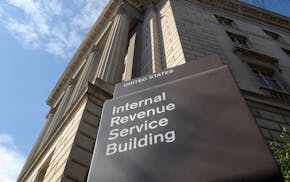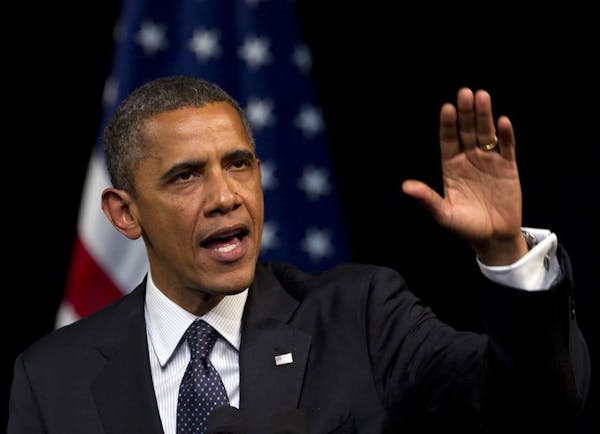Whoever captures the White House on Nov. 6, the election season produced one clear winner: William Jefferson Clinton.
The 42nd president, starting with his speech at the Democratic National Convention establishing the predicate for President Barack Obama's economic message, set a new standard for effective political surrogates. Republicans, including more than a few who voted, on specious grounds, to impeach him 14 years ago, extolled the good old days of the Clinton presidency. There is no more popular political figure.
If Obama wins he should be much more solicitous of Clinton in a second term. The relationship between the two political figures has improved. Clinton's stature is off the charts, given his unsurpassed political instincts and standing at home and around the globe, and the fact that his wife will be the early favorite to be the next Democratic presidential nominee.
If Mitt Romney wins, Clinton becomes the patriarch of the loyal opposition, the most effective advocate against Republican efforts to govern from the conservative right.
"Bill Clinton has an incredible shelf life," says Vic Fazio, a former Democratic representative. "Whether speaking to the convention or working as small fundraiser the magic is still there. Bill Clinton never walks away."
If Obama is defeated he'll remain a historic firgue, the first black president. Much of his legacy, including the health-care bill and financial-regulation overhaul, will be shredded by Republicans. And Democrats will say the defeat was self-inflicted because the president and his top advisers decided to coast during the first debate. He could have knocked out Romney; instead he let his opponent back in the fight.
In defeat, Romney would be a political pariah. Other defeated candidates - Bob Dole, John McCain - remain respected figures within the party. Romney will be seen as a mediocre candidate, a chameleon, and an unprincipled political opportunist who snatched defeat from the jaws of victory. There will be few invites to Republican celebrations such as the Lincoln Day dinners.
Political pollsters have a lot at stake, too. Two of the most controversial are the Republican-centered Rasmussen Reports, whose daily surveys tend to favor that party, and the Democratic-oriented Public Policy Polling, whose surveys tilt in the other direction. What they share is a methodology of huge volume, because they conduct automatic surveys, or robo-calls, in which respondents simply push keypad buttons to express preferences.
The more established pollsters doubt the validity of this approach, because it includes very few mobile phones. Both Rasmussen Reports and PPP insist they adjust for this omission.
Other major polltakers pay extra to buy a mobile-phone sample. Peter Hart, who conducts the Wall Street Journal/NBC polls, says 30 percent of his
ndents are mobile-phone users. Ann Selzer, who polls for Bloomberg and the Des Moines Register, sets the quota at 25 percent.
The Democratic pollster Stan Greenberg argues that at least a third of voters would be missed without contacting mobile phones, which are disproportionately used by young people and minorities.
No pollster has more at stake than the venerable Gallup organization, whose daily tracking poll includes 50 percent mobile phones. It has consistently given Romney an advantage over the last several weeks. Other pollsters question Gallup's methodology for defining likely voters, arguing it's outdated; Gallup says it stands by its results.
Then there is Nate Silver, a politics and sports statistical guru who runs thousands of models. He became a legend in 2008 when his fivethirtyeight.com models correctly predicted all 35 Senate contests and 49 of the 50 state outcomes in the presidential race. Now at the New York Times, he says there is a greater than 80 percent probability that Obama wins re-election. The Silver legend will either be embellished or diminished this week.
There's no such risk for Clinton, who will be riding high even in a Romney presidency. He'll be the Democrats' as he seeks to persuade his wife to pick up the torch in 2016.
He'd do the same in a second Obama term. It's more interesting to speculate about the role he might play in that administration.
That largely would be up to Obama. If he is smart - and if he ignores the pettiness of some advisers - he'll periodically talk to his predecessor on policy even more than politics. In the first term, former White House Chief of Staff Rahm Emanuel regularly checked in with Bill Clinton. The current director of the National Economic Council, Gene Sperling, still does. Before the Democratic Convention, the president only went through the motions of consulting with and cultivating Clinton.
During this campaign, the 66-year-old former president has done about 100 events, helping more than 50 congressional candidates and going on dozens of occasions wherever Team Obama asked.
On the night of Nov. 3, Clinton and Obama, joined at the hip politically, electrified a crowd of 24,000 in , Va. A raspy-voiced Clinton effusively praised the incumbent, especially for his handling of the economy, and assailed Romney's economic positions and his flip-flops on the rescue of the U.S. automobile industry. A buoyant Obama called his predecessor the "secretary of explainin' stuff."
Hours later, they headed to New Hampshire for a final joint rally; Clinton would then be off to Pennsylvania to thwart a last-minute Republican bid for an upset.
Readers Write: Politicized education, presidential debates, election strategies, small-town papers

Taxes increasingly paying for the past — not the future
!["Since the [Hennepin Healthcare System] Board took control in 2007, CEO pay increased by more than 142%. Meanwhile, that same board sunsetted employee](https://arc.stimg.co/startribunemedia/J7MD7DSJWMP3KYIYUSCQTABOAA.jpg?h=91&w=145&fit=crop&bg=999&crop=faces)

